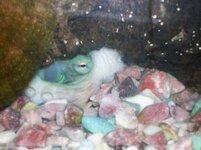All -
My bimac has undergone a serious behavior change that has me very concerned. I have had her for about three months, for most of which she has been a voracious eater and has grown to perhaps twice the size she was when I got her.
A few weeks ago there was a strong nitrate spike in her tank. I got it under control with water changes but since then her behavior has changed drastically. She made a new cave for herself under a large rock (partly because she no longer fit in her old favorite haunt), and no longer comes out to roam around. She cleared the area in front of the cave and any food I put there just gets pushed away. She has not eaten anything but small ghost shrimp in over a week. She no longer seems to accept live clams, fresh shrimp, or fish. She will taste them and then push them away.
I put a coral banded shrimp in there but again, she just pushed it away when it came close. I have not tried crabs as they are difficult to get around here (except for either miniscule emerald or hermit crabs, or giant-sized blue or dungeness crabs). I may try to go scrounge some up from a local beach.
I'm worried! Any ideas?
thanks!
Tony
My bimac has undergone a serious behavior change that has me very concerned. I have had her for about three months, for most of which she has been a voracious eater and has grown to perhaps twice the size she was when I got her.
A few weeks ago there was a strong nitrate spike in her tank. I got it under control with water changes but since then her behavior has changed drastically. She made a new cave for herself under a large rock (partly because she no longer fit in her old favorite haunt), and no longer comes out to roam around. She cleared the area in front of the cave and any food I put there just gets pushed away. She has not eaten anything but small ghost shrimp in over a week. She no longer seems to accept live clams, fresh shrimp, or fish. She will taste them and then push them away.
I put a coral banded shrimp in there but again, she just pushed it away when it came close. I have not tried crabs as they are difficult to get around here (except for either miniscule emerald or hermit crabs, or giant-sized blue or dungeness crabs). I may try to go scrounge some up from a local beach.
I'm worried! Any ideas?
thanks!
Tony


 Second, sounds like your octopus is preparing for pending motherhood. Unfortunately the "denning" behavior is what they do along with the refusal of food. From looking at her pic are you sure she's a bimac? She has the classic coloring of the tropical octopuses and unfortunately the name escapes me but if you look at my posts under Egor, she looks just like her species. Keep offering food, as I've also had the exception to the no eating rule where Ink continued to eat several weeks after her eggs disapeared. Best of luck!
Second, sounds like your octopus is preparing for pending motherhood. Unfortunately the "denning" behavior is what they do along with the refusal of food. From looking at her pic are you sure she's a bimac? She has the classic coloring of the tropical octopuses and unfortunately the name escapes me but if you look at my posts under Egor, she looks just like her species. Keep offering food, as I've also had the exception to the no eating rule where Ink continued to eat several weeks after her eggs disapeared. Best of luck!